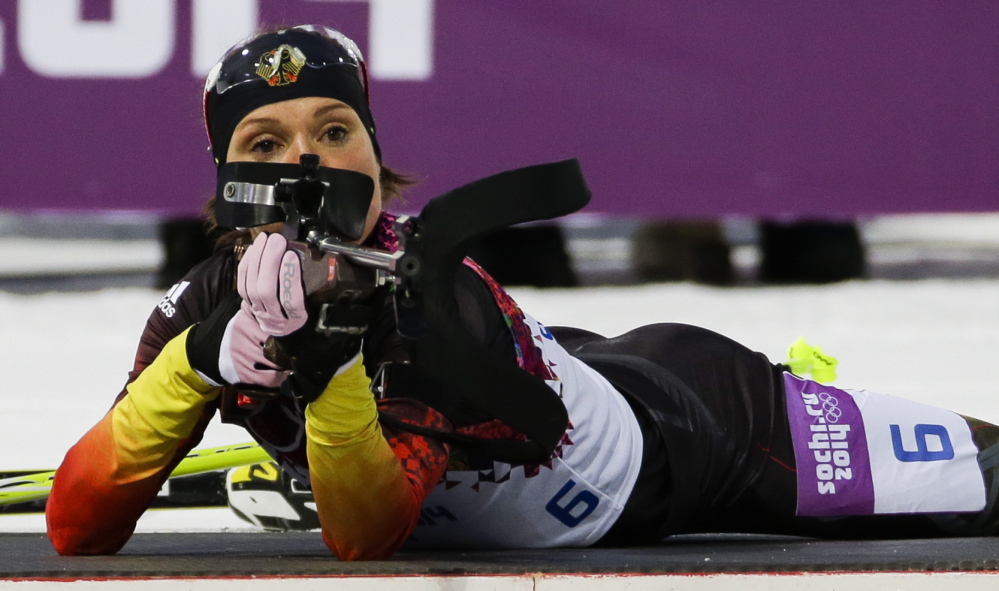SOCHI, Russia — A top German biathlete and an Italian bobsledder were kicked out of the Sochi Olympics on Friday in the first doping cases of the Winter Games.
Former two-time Olympic gold medalist Evi Sachenbacher-Stehle tested positive for the stimulant methylhexanamine in both her “A” and “B” samples, the German Olympic Committee said.
The committee said she has been removed from the team and was being sent home.
Sachenbacher-Stehle — winner of two golds and three silvers in cross-country skiing at previous games — blamed the positive test on a nutritional supplement and said she had never knowingly taken performance-enhancing drugs.
“I am going through the worst nightmare that you can imagine, because I am unable to explain at all how there could be a positive test,” she said in a statement.
The Italian Olympic Committee, meanwhile, announced that bobsledder William Frullani was ejected from the games after testing positive for the banned stimulant dimetylpentylamine in the athletes village on Tuesday.
Frullani, who had not competed yet, asked for a backup test that “confirmed the positive result, resulting in his exclusion from the Italian delegation,” CONI said.
The IOC declined to comment, citing confidentiality of ongoing anti-doping procedures.
Sachenbacher-Stehle, who switched from cross-country to biathlon two years ago, competed in five events in Sochi but did not win any medals. Her best results were two fourth-place finishes, in the 12.5K mass start and the mixed relay.
The 33-year-old German was tested after Monday’s mass start race. Her backup sample was tested on Friday and confirmed the original finding. Her expulsion from the games was announced after she appeared before an IOC disciplinary commission on Friday afternoon.
Sachenbacher-Stehle had been left off Germany’s top-ranked women’s relay team before Friday night’s 4×6-kilometer relay. The team finished 11th.
Franziska Hildebrand, who skied the third leg for Germany, said the team was told about the doping case earlier in the day.
“We are totally shocked,” Hildebrand said.
Methylhexanamine is classified on the World Anti-Agency’s prohibited list as a “specified stimulant,” a group of substances that are more susceptible to inadvertent use and can carry reduced penalties.
Sachenbacher-Stehle said she had her nutritional supplements checked in a lab or cleared by the manufacturer before the games.
“At the moment I can only assure all involved that I never knowingly took banned substances,” she said.
Any further sanctions outside of the Olympics are up to the International Biathlon Union. The German could face a ban from the sport for a year or more.
Michael Vesper, chief of German Olympic body DOSB, said athletes have been repeatedly warned about supplements that contain methylhexanamine.
“The DOSB strives for a doping-free sport and a zero tolerance policy,” he said in a statement. “We strive only for cleanly achieved performances. Every doping case is first of all a big disappointment. But it is also proof that that control system works.”
Stefan Schwarzbach, spokesman for the German biathlon and cross-country teams, said a contaminated supplement is a possible explanation for Sachenbacher-Stehle’s positive test.
“We are not sure if it’s really from an unproven, or dirty, supplement,” he said. ” We really don’t know.”
“It really seems that it is a mistake,” Schwarzbach added. “And she has to handle the consequences.”
As a cross-country skier, Sachenbacher-Stehle won gold medals in the team sprint at the 2010 Vancouver Olympics and 4x5K relay at the 2002 Salt Lake City Games. She won silver medals in Salt Lake, Vancouver and at the 2006 Turin Games.
The only previous German athlete sanctioned for doping at a Winter Olympics was hockey player Alois Schloder, who was disqualified from the 1972 Sapporo Games after a positive test for ephedrine.
German-born cross-country skier Johan Muehlegg was competing for Spain in 2002 when he was caught doping and stripped of one of his three gold medals at the Salt Lake City Olympics.
In the Italian case, CONI told The Associated Press that it believed Frullani, a former decathlete, purchased the stimulant on the Internet from the United States, since it is not available in Italy.
Dimethylamphetamine is also classified as a “specified stimulant” on the WADA list.
Samuele Romanini will replace Frullani as the brakeman for the four-man bobsled race, which begins Saturday.
The IOC is conducting 2,453 drug tests in Sochi, a record for the Winter Games.
The IOC also stores Olympic doping samples for 10 years to allow for retesting when new methods become available.
Send questions/comments to the editors.




Comments are no longer available on this story